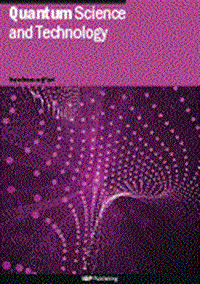Reducing measurement costs by recycling the Hessian in adaptive variational quantum algorithms
IF 5.6
2区 物理与天体物理
Q1 PHYSICS, MULTIDISCIPLINARY
引用次数: 0
Abstract
Adaptive protocols enable the construction of more efficient state preparation circuits in variational quantum algorithms (VQAs) by utilizing data obtained from the quantum processor during the execution of the algorithm. This idea originated with Adaptive Derivative-Assembled Problem-Tailored variational quantum eigensolver (ADAPT-VQE), an algorithm that iteratively grows the state preparation circuit operator by operator, with each new operator accompanied by a new variational parameter, and where all parameters acquired thus far are optimized in each iteration. In ADAPT-VQE and other adaptive VQAs that followed it, it has been shown that initializing parameters to their optimal values from the previous iteration speeds up convergence and avoids shallow local traps in the parameter landscape. However, no other data from the optimization performed at one iteration is carried over to the next. In this work, we propose an improved quasi-Newton optimization protocol specifically tailored to adaptive VQAs. The distinctive feature in our proposal is that approximate second derivatives of the cost function are recycled across iterations in addition to optimal parameter values. We implement a quasi-Newton optimizer where an approximation to the inverse Hessian matrix is continuously built and grown across the iterations of an adaptive VQA. The resulting algorithm has the flavor of a continuous optimization where the dimension of the search space is augmented when the gradient norm falls below a given threshold. We show that this inter-optimization exchange of second-order information leads the approximate Hessian in the state of the optimizer to be consistently closer to the exact Hessian. As a result, our method achieves a superlinear convergence rate even in situations where the typical implementation of a quasi-Newton optimizer converges only linearly. Our protocol decreases the measurement costs in implementing adaptive VQAs on quantum hardware as well as the runtime of their classical simulation.在自适应变分量子算法中通过回收赫塞斯降低测量成本
自适应协议通过利用在算法执行过程中从量子处理器获取的数据,能够在变量子算法(VQAs)中构建更高效的状态准备电路。这种算法逐个算子迭代地增长状态准备电路,每个新算子都伴随着一个新的变分参数,而且迄今为止获得的所有参数都在每次迭代中得到优化。ADAPT-VQE 及其后的其他自适应 VQA 均表明,将参数初始化为上一次迭代的最优值可加快收敛速度,并避免参数景观中的浅局部陷阱。但是,在一次迭代中进行的优化所产生的其他数据不会被带到下一次迭代中。在这项工作中,我们提出了一种专门针对自适应 VQA 的改进型准牛顿优化协议。我们建议的显著特点是,除了最优参数值外,成本函数的近似二次导数也会在迭代中循环使用。我们实现了一种准牛顿优化器,在这种优化器中,逆黑森矩阵的近似值会在自适应 VQA 的迭代过程中不断建立和增长。由此产生的算法具有连续优化的特点,当梯度法低于给定阈值时,搜索空间的维度会增加。我们的研究表明,这种优化间的二阶信息交换会使优化器状态下的近似赫塞斯不断接近精确赫塞斯。因此,即使在准牛顿优化器的典型实现仅为线性收敛的情况下,我们的方法也能达到超线性收敛率。我们的协议降低了在量子硬件上实现自适应 VQA 的测量成本以及其经典模拟的运行时间。
本文章由计算机程序翻译,如有差异,请以英文原文为准。
求助全文
约1分钟内获得全文
求助全文
来源期刊

Quantum Science and Technology
Materials Science-Materials Science (miscellaneous)
CiteScore
11.20
自引率
3.00%
发文量
133
期刊介绍:
Driven by advances in technology and experimental capability, the last decade has seen the emergence of quantum technology: a new praxis for controlling the quantum world. It is now possible to engineer complex, multi-component systems that merge the once distinct fields of quantum optics and condensed matter physics.
Quantum Science and Technology is a new multidisciplinary, electronic-only journal, devoted to publishing research of the highest quality and impact covering theoretical and experimental advances in the fundamental science and application of all quantum-enabled technologies.
 求助内容:
求助内容: 应助结果提醒方式:
应助结果提醒方式:


